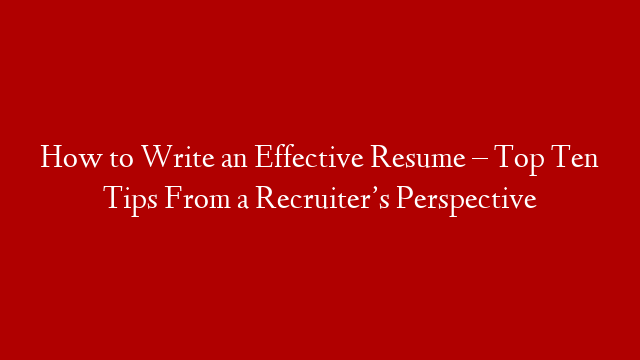Your resume is one of your most important marketing tools. But remember, no matter how great it is, your resume will NOT get you a job. If it if written properly, however, the odds are much greater that you may gain a recruiter’s interest and be invited to interview.
As a Senior Recruiter for both small firms and large corporations, I have reviewed thousands of resumes during my 15+ years of recruiting and HR experience. My experience is that applicants often tend to miss these most important aspects that could make their resume more effective in attracting the attention and interest of recruiters and hiring managers.
Resume purpose: to market and sell your background, skills, accomplishments, and experience to those who have a need for your expertise or a problem that you can solve.
Resume role: to create interest, to show that you indeed have the requisite skills and experience, and to get a recruiter and/or hiring manager interested enough to invite you to interview.
Top Ten Tips for Writing an Effective Resume (from a recruiter’s point of view):
1. You can (and should) have more than one resume! Create a separate resume for the top two to three main areas of your expertise. (For example, one resume for marketing, one for sales, one for engineering). Each resume should highlight specific examples of your accomplishments, skills, and experience from your current and previous roles that directly relate to that particular area of expertise.
2. Two Pages in Length, Max. Condense, condense, condense! Pretend that each word costs you $100 and you will write less, enabling you to fit your most important information on two pages. (Exception: doctors and other published professionals often need a few more pages to list their credentials and published works. But even they should keep it as short as possible). Have someone whose opinion you trust proofread your resume and edit where necessary before sending it out.
3. Choose an Appropriate Format. The best and easiest resume format to review is chronological (starting with most recent job and date and working backwards through your job history). However, a functional resume format is often suggested as an option especially for those who have been out of the job market for a while or who want to change careers. But it can raise red flags that could stop your resume from being reviewed further. Recruiters know that a functional format is often used to hide gaps in employment dates. In addition, details for skills and experience are lumped together into separate functional areas, instead of under each particular job held in the past. In many cases, because of the time and difficulty involved in reading a functional resume, recruiters often pass them over and move on to the next one.
4. Focus Your Attention on The Most Important “Real Estate” on Your Resume: the top half of the front page. Why? Because recruiters today are inundated with resumes, especially in these tough economic times when so many are out of work. Often, recruiters are managing anywhere up to 50+ jobs at one time, with each one having hundreds and hundreds of resume submissions. The average time an experienced recruiter spends initially scanning a resume to determine if it is relevant to the position is approximately 7 to15 seconds. If the top half of your resume does not quickly differentiate and sell you as a viable candidate with recent and relevant skills and experience for the specific job for which you are applying, the recruiter will simply move on to the next one.
5. Develop a Keyword Rich Resume. Be sure to add the main keywords for your skills and experience as well as your industry and organizational keywords all through your resume. Recruiters use various types of search tools in ATS (applicant tracking systems) where they type in main keyword terms for the specific job and position qualifications to search for related resumes. They also conduct similar keyword searches online on major job boards and even some social media sites. Only resumes that contain those keywords will appear in their review box and those are the only resumes that they will scan for consideration. If your main keywords are not in your resume, it is very likely that your resume will not be reviewed, even though you may be very well qualified.
6. Create a Brief Bullet Point Summary. At the top of the front page of your resume, list 5 to 7 bullet point phrases that highlight your most compelling skills, experience, accomplishments, training and education. This summary should be located somewhere within the very top third section of the resume underneath but close to your name and contact information. Critical: avoid “fluff” or trite phrases such as “Good at multitasking” or “Detail oriented”, etc. The reader’s eye should be able to quickly scan the summary section and determine at a glance that your resume is one worth continuing to read through to the end.
7. Quantify and Qualify Your Experience. Recruiters and hiring managers highly value proven accomplishments and results. The more you can quantify or qualify your bullet point statements under each of your position listings, the more strongly you will be perceived as a person of action and results. After each statement, ask yourself, “What did I accomplish?” or “What was the result?”. Try to tie a quantifiable result to the end of each statement if possible, such as, “and as a result, saved the company $X” or “increased revenues by X%”, or “sold the most widgets on the team and was selected as employee of the year”.
8. Focus on Your Most Recent and Relevant Job Information. Recruiters and hiring managers want to know what you have done most recently that is relevant to the position for which they are hiring. Write the bulk of your resume information about your skills, experience and accomplishments for the most recent 5 to 7 years of your job history. Unless your experience past that point is unusually helpful for stating your case, minimize that information to save valuable resume space. Beyond 7 to 10 years of job history, you can just list one or two line entries for each position held. Save the rest of the details of those positions for the application form and interviews.
9. Place Your Key Credentials, Certifications, and Educational Experience Sections In a Conspicuous Place. A bachelors degree should typically be located near the end of the resume under the educational section heading. However, do you have a job-related advanced degree such as an MBA, PhD, or other certifications or credentials that you want to make sure a recruiter or hiring manager sees? Place them toward the top front section of your resume, right before or after the summary section. Why? If you bury them at the end of your resume, they may never be seen. (See Tip #4)
10. List Organizations, Associations and Affiliations of which you are a volunteer or member. Often overlooked, this information can be a great way to show an employer that you stay current with information and contacts in your industry. If you volunteer for positions, especially leadership roles, be sure to list those as well. This information is especially important for those applying for roles in financial services and sales and marketing firms who need to show that they already have an established network. Place this section of information near the end of your resume.
This final tip is a bonus. However, it is THE single most important tip of all in writing an effective resume.
Always tell the truth, the whole truth, and nothing but the truth on your resume…always! Never, ever misrepresent what you did or be tempted to tell a “little white lie” on your resume or to a recruiter – period! Be especially careful with job titles and job responsibilities you list. Make sure that the job title and responsibilities you put on your resume can actually be verified if someone were to call your current or former employer or colleagues and ask about you. Untrue and misrepresented statements, no matter how innocent they may seem, are a breach of integrity and can come back to haunt you many years later. You could even be fired as a consequence! It just isn’t worth it.
Use these ten tips to tighten and refine your resume and then you can submit it with confidence!
(c) Copyright 2009 Dresser Search and Consulting, Inc.


